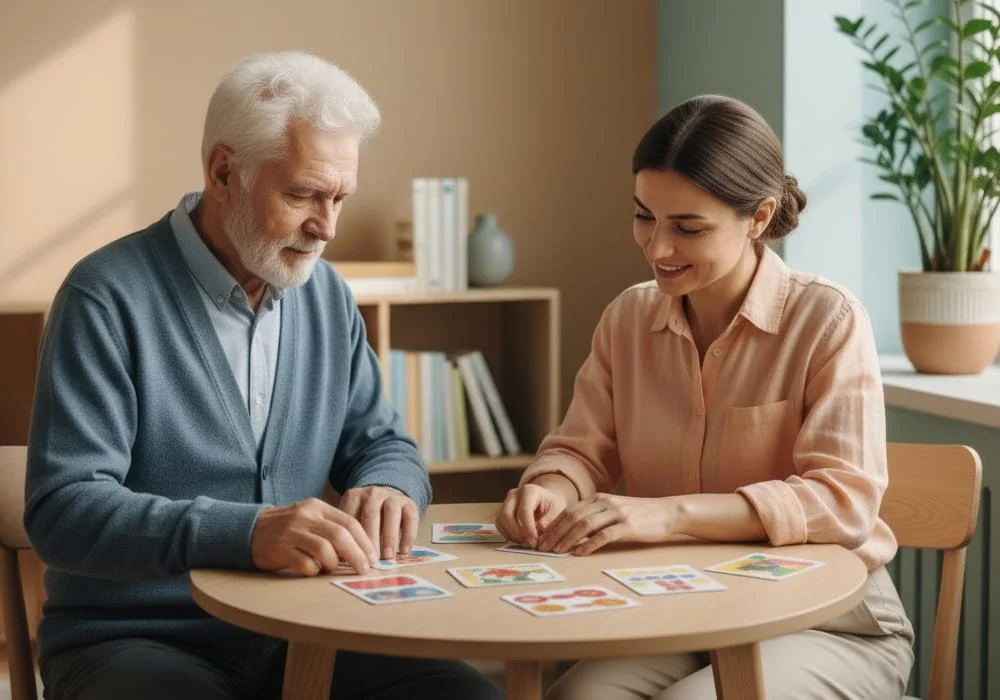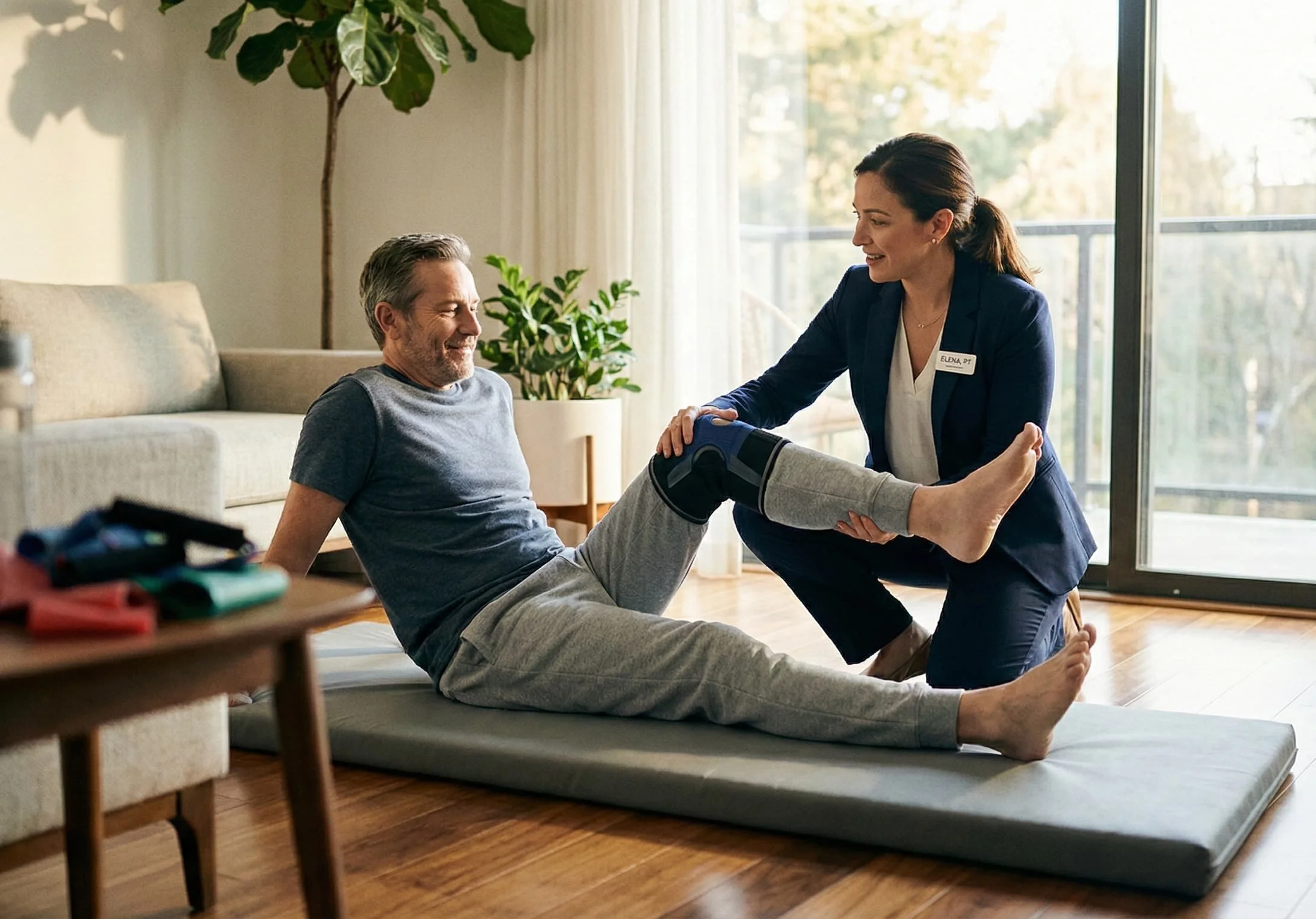Cognitive Therapy For Memory Decline: Can It Slow Down Dementia?
Aging changes how the brain keeps and processes information. Families often ask a simple question: can mental training make that change slower? Research gives a mixed answer. It cannot stop disease, yet it often preserves function. Cognitive Therapy For Memory Decline: Can It Slow Down Dementia? explains what that difference means in daily life.
Understanding The Core Concepts
Talk Therapy: Managing Reactions And Stress
When memory slips start, anxiety and frustration usually follow. Talk therapy helps people deal with that stage. It teaches them to track their own thoughts, calm panic, and keep routine steady. The point is not to reverse decline but to make life workable. Once anxiety drops, people follow medication schedules better and stay socially active. That, in turn, supports brain health.
Cognitive Training: Practicing Mental Speed
Cognitive training uses brief, repeated tasks to improve reasoning or reaction time. The NIH ACTIVE study followed older adults for a decade. Those who practiced reasoning and speed kept those skills longer than others. Memory training alone faded faster. The lesson is clear: repetition and focus on reasoning give more lasting returns than general “brain games.”
Cognitive Rehabilitation: Adapting Everyday Life
Rehabilitation connects therapy with daily habits. Specialists help set reminders, structure tasks, and train caregivers to keep routines consistent. The Mayo Clinic recommends this method for mild cognitive impairment because it replaces guesswork with systems. Bills get paid on time. Medications are not forgotten. Safety improves without depending on memory alone.
What Long-Term Evidence Shows
Skill Gains Stay Longer Than Disease Control
Large U.S. trials—ACTIVE and follow-ups—show that training keeps specific abilities stronger for years. But none proved that it prevents dementia itself. NIH data confirm the same: practice helps function, not pathology. That distinction matters.
Functional Independence Carries The Real Value
Across ten years of observation, people who trained needed less help with complex activities. They planned meals, organized finances, and managed errands longer. CDC reviews say that maintaining such “instrumental activities of daily living” delays caregiver burnout and lowers medical costs. Even if biology stays the same, life runs smoother.
Why Some Improve More Than Others
Results vary. Kaiser Permanente research notes that education, regular social contact, and controlled health conditions predict better outcomes. Those with untreated hearing loss, depression, or chronic pain progress faster toward disability. It means training works best inside a complete care plan, not alone.
Why Results Differ
Practice Style And Consistency
Short sessions several times a week outperform long, rare ones. Reasoning and speed respond best to repetition. Memory gains fade unless paired with cues—labels, lists, visual prompts. Like physical exercise, it is routine that builds results, not effort on one weekend.
Environment And Support Around The Person
Bright light, calm spaces, and guidance matter more than many expect. Caregiver coaching and structured programs such as Dementia Partner or Senior Helpers Of North Valley extend therapy into real routines. Families who work together keep the benefits longer.
Health Anchors Shape Cognitive Reserve
CDC highlights hearing, vision, sleep, and physical activity as critical to brain function. When these anchors are stable, attention lasts longer and learning sticks. Ignoring them cancels half the effort of cognitive training.
Translating Research Into Daily Action
Step 1. Establish A Cognitive Baseline
Start with an evaluation. It maps which skills are intact and which need support. NIH suggests doing this early, when changes first appear, because intervention works best before independence slips.
Step 2. Begin Small, Stay Steady
Choose one domain—speed or reasoning—and train regularly. Programs like FUNCTherapy combine cognitive and movement exercises so that mental and physical progress reinforce each other.
Step 3. Build External Systems For Memory
For forgetfulness, use structure: checklists, alarms, color-coded notes. The Mayo Clinic recommends this pragmatic method. XL Care Home Health Agency often installs these routines during home-based nursing visits so patients and families follow the same pattern.
Step 4. Keep The Body Moving
Moderate exercise, daylight, and social contact strengthen neural pathways. CDC and NIH both list physical activity among the top interventions for maintaining brain health.
Step 5. Refresh Regularly
Booster sessions matter. Without them, even the best routines fade. Providers like Dementia Partner help track progress and re-adjust plans every few months.
Evidence At A Glance
| Intervention | Goal | What Lasts | What Fades | Everyday Effect |
|---|---|---|---|---|
| Talk Therapy | Reduce anxiety, improve coping | Emotional stability | Loses effect if stopped | Clearer mood, better focus |
| Cognitive Training – Reasoning/Speed | Strengthen mental agility | Holds for years | Limited transfer | Slower functional decline |
| Cognitive Training – Memory | Practice recall | Short-term help | Weak persistence | Stronger with reminders |
| Cognitive Rehabilitation | Maintain independence | Stable routines | Needs updates | Safer, more organized life |
Practical Examples
Getting Confidence Back
A retired teacher stopped driving after getting lost. Short speed-processing drills, paired with navigation cards, helped her regain confidence. Senior Helpers Of North Valley guided her through real-world practice. Within months she was comfortable driving short familiar routes again.
Safer Cooking At Home
A widower with mild memory loss worried about the stove. A nurse from XL Care Home Health Agency introduced a checklist and bright “off” indicators. After a few weeks, the anxiety eased. He no longer double-checked burners every ten minutes.
Simplifying Medication
One client used a weekly pill box and phone reminders designed by FUNCTherapy staff. Combining motion exercises and task repetition improved focus. Missed doses stopped, and balance improved too.
Policy And National Programs
The CMS GUIDE Model
In 2024, Centers for Medicare & Medicaid Services (CMS) began the GUIDE Model pilot. It connects patients with Care Navigators who coordinate medication, education, and caregiver training. Families can access it through participating agencies like XL Care Home Health or partner services such as Completely Senior LLC.
Broader Public-Health Context
CDC’s Healthy Brain Initiative and NIH’s Alzheimer’s Research Centers both emphasize prevention basics—exercise, social engagement, and chronic-disease control. These low-tech actions still have the highest impact on long-term brain health.
Working Within The Limits
Biology Still Leads The Timeline
Cognitive training does not stop disease processes. What it does is raise the functional line—allowing a person to stay capable for more years. NIH calls this building cognitive reserve.
Memory Needs Tools, Not Just Effort
External aids—labels, photos, visual cues—work better than pure recall drills. Mayo Clinic and CDC both show that structured environments reduce confusion and accidents.
Routine Beats Intensity
It’s not about working harder. It’s about keeping rhythm. A few minutes daily with guidance from Dementia Partner or FUNCTherapy brings steadier progress than rare marathon sessions.
Focus On Function, Not Cure
Cognitive Therapy For Memory Decline: Can It Slow Down Dementia?
Current science says it slows decline in function, not the disease itself. Still, that is meaningful progress. People maintain routines, families get relief, and safety improves. Combined approaches—training, rehabilitation, emotional care—extend independence and dignity. Programs by Dementia Partner, Senior Helpers Of North Valley, and FUNCTherapy prove that consistency works better than promises of reversal.
How To Begin
Schedule A Cognitive Assessment to understand baseline abilities.
Pick One Daily Problem—medication, planning, or transport—and structure it.
Follow A Short Routine guided by experienced specialists.
CDC and NIH publish free guides for families beginning this process. They outline realistic steps rather than miracle cures.
FAQ
1. How do I find or schedule a cognitive assessment for my loved one?
You can ask a primary care physician or neurologist to arrange a cognitive evaluation. Many home health providers — such as Dementia Partner and XL Care Home Health Agency — offer in-home memory assessments and coordinate results directly with families. Early testing helps detect reversible issues and guides next steps.
2. Are the mentioned programs and providers available in my area or covered by insurance?
Most organizations, including FUNCTherapy, Senior Helpers Of North Valley, and Completely Senior LLC, operate within Arizona and Southern California. Availability may differ by ZIP code. Some services are private-pay, while others collaborate with the Doctor2me network to simplify referrals and scheduling.
3. What specific steps can I take at home if professional support is not immediately available?
Keep a clear routine. Use written lists, visual cues, and regular mealtimes to reduce confusion. Encourage light exercise and short mental tasks — reading aloud, matching pictures, or organizing simple objects. CDC and NIH recommend pairing cognitive practice with movement and social contact whenever possible.
4. How can I tell if cognitive training is working or needs adjustment?
Improvement appears when daily tasks become smoother: fewer reminders, better focus, more confidence. If those gains fade, it may be time to update the program. Providers such as FUNCTherapy and Dementia Partner help families track results and adapt the plan based on observed progress.
5. Where can I find emotional support or counseling for myself as a caregiver?
Caregiving often feels overwhelming. Emotional support is available through Westlake Village Hospice, Inc., Completely Senior LLC, and local caregiver groups listed on the Doctor2me platform. Many programs now offer free or low-cost online counseling to reduce isolation and stress.
You May Also Like





